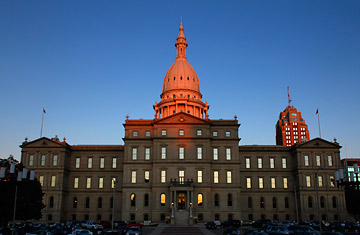
Twilight falls on the Michigan state Capitol building.
When Michigan's lieutenant governor, John Cherry, announced earlier this month that he wouldn't seek the state's top elected post, Democrats here and across the country sighed in relief. Though Cherry was the ostensible front runner to succeed Jennifer Granholm, a fellow Democrat, he couldn't muster enough interest, or money, to wage a credible campaign. Cherry's departure effectively opens what's expected to be a fierce primary battle between two ambitious, business-minded Democrats for the task of keeping Michigan's governor's seat in the party's hands.
The emerging battle in Michigan in many ways reflects what's at stake for Democrats nationwide this year: 37 states are scheduled to hold gubernatorial elections in 2010; Democrats hold 19 of those seats, and Michigan is viewed as a toss-up by both major parties. The governor's races, as well as the congressional elections, will therefore be key tests of whether the Democrats will extend their gains of recent years or succumb to the same backlash that propelled Republican Scott Brown to his upset victory in the Massachusetts Senate race this week. The stakes are particularly high in Michigan, because whoever is elected governor will play a crucial role in redrawing legislative districts in the wake of the 2010 U.S. Census, which is expected to show significant population declines here during the past decade.
Democrats carry the stigma of being tied to Granholm, who in two terms has struggled to guide Michigan through economic and financial crises driven mainly by the state's dependence on the ailing auto industry. Several Republicans have emerged as hopefuls for the the primary to be held in August, including Mike Cox, Michigan's attorney general, and Mike Bouchard, a former state senator and the current sheriff of Oakland County, the center of Michigan's wealth. So far, however, none has generated much excitement.
Most of the attention has focused on the prospective Democratic candidacies of Andy Dillon, speaker of Michigan's house of representatives, and Denise Ilitch, a scion of the family that owns the Little Caesar's pizza chain and the Detroit Red Wings hockey team. The Democrats, says Michigan political analyst Bill Ballenger, are "holding their breath and saying, 'This is going to be a dogfight.'"
Lanky and telegenic, Dillon, 48, is the son of a former judge. Trained as a lawyer, he worked as a steel-company president before winning a seat in Michigan's house of representatives in 2004. He built a fairly conservative record (he is Catholic and opposes abortion); his efforts to restructure the state health care system to sharply reduce costs endeared him to Michigan's business élite but infuriated unions, historically a key Democratic voting bloc.
Ilitch, 55, bills herself as a self-made businesswoman. Also trained as a lawyer, Ilitch worked for her family's pizza and sports enterprise before launching her own jewelry company. She also co-owns a local lifestyle magazine called Ambassador. She is a fixture on Detroit's civic scene, joining Detroit Mayor Dave Bing's transition team last year and frequently challenging some of his top advisers to make deeper budget cuts. "She zeroed in on the finance piece as her baby, trying to get them to think through how to make immediate cuts," recalls a person familiar with the discussions, adding, "She's in your face."
Still, some observers are skeptical that Ilitch has the stamina and gravitas to endure a grueling political race. Apart from being on the Bing transition team, Ilitch has little political experience (she was also elected to the University of Michigan's board of regents), and her views on many social and political issues are largely unknown. In recent days, local news reports have presented her as the Obama Administration's preferred candidate, but she has reportedly donated money in the past to Republicans as well as Democratic causes and candidates. Fundraising is expected to be tricky in the current economic environment, although Ilitch's personal fortune may give her an edge.
No polling has been conducted to gauge how the electorate's mood has shifted since Cherry's announcement. "For both the Democrats and the Republicans, so much is in the air," says Ballenger. Republicans are very aware that if they are to replicate Brown's Massachusetts success in their quest to win back Michigan's governor's seat, the party must aggressively court independents and conservative Democrats — who are also part of the base of support for Dillon and Ilitch. "The message," says Ron Weiser, Michigan's GOP chair, "has to be about the economy and why we're able to make the changes necessary to stop the avalanche that our economy is rolling down."
